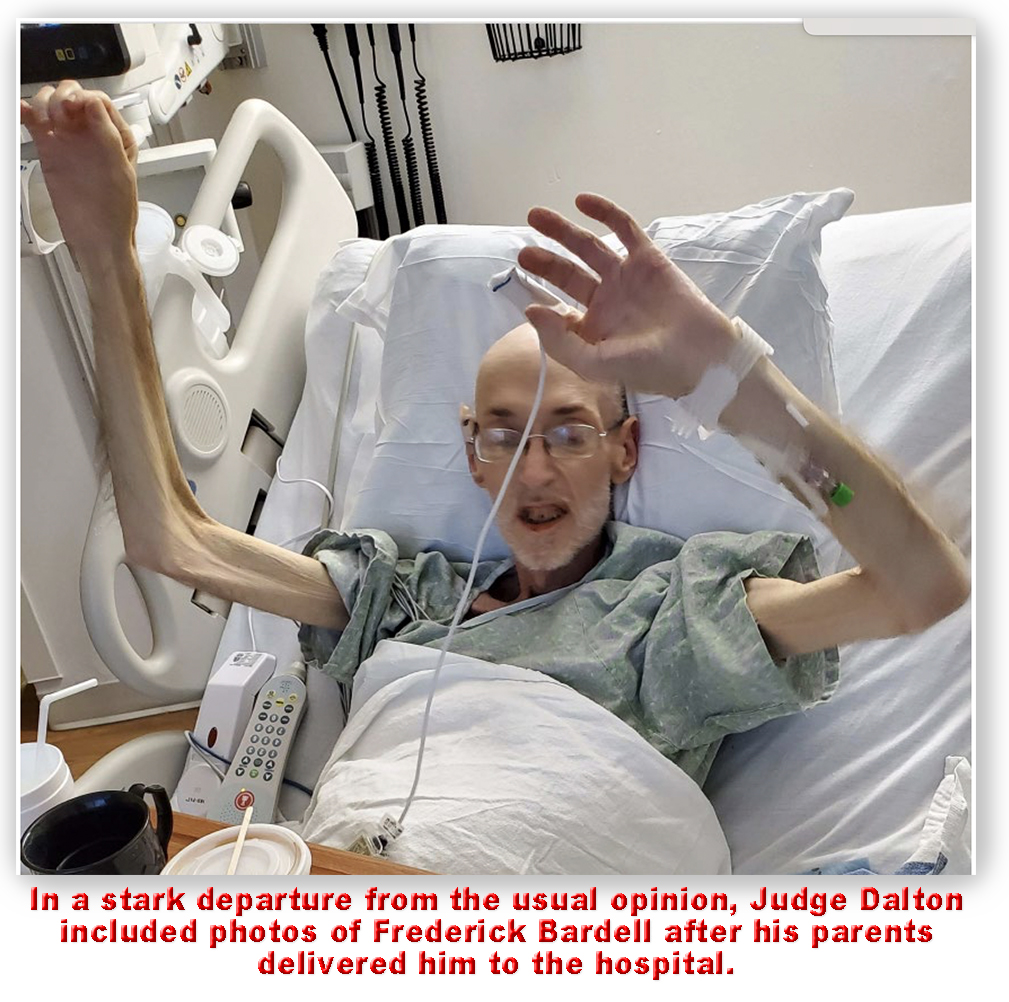We post news and comment on federal criminal justice issues, focused primarily on trial and post-conviction matters, legislative initiatives, and sentencing issues.

BOP MISTREATMENT OF DYING INMATE DYING OF CANCER SPARKS OUTRAGE
The murder of George Floyd by Minneapolis police officer Derek Chavin captured the nation’s attention and fury like no event in the recent history of policing and race. With an angry opinion from U.S. District Judge Roy Dalton (Middle District of Florida), the late Frederick Mervin Bardell’s tragic mistreatment may do the same for the Federal Bureau of Prisons.
Fred was housed at FCI Seagoville, finishing a 151-month sentence for possession of child pornography, when he developed an intestinal mass that turned into metastatic colon cancer. As Judge Dalton put it, “Frederick Marvin Bardell was a convicted child pornographer. He was also a human being.”
In November 2020, Fred filed a motion for compassionate release, complaining that he suffered from “unspecified bleeding,” “metastatic liver lesions (suspected cancer),” and “malignancy in his colon.” His medical expert averred that Fred “ha[d] a high likelihood of having cancer of the colon with likely metastasis to the liver.”
 The BOP admitted that Fred has “liver lesions highly suspicious for metastatic disease” but argued that “to date, no one has determined that [his] condition is terminal.” The Government also maintained that there was no indication that Fred could not receive adequate care in custody. Based on the Government’s assurance, the Court denied his November compassionate release motion.
The BOP admitted that Fred has “liver lesions highly suspicious for metastatic disease” but argued that “to date, no one has determined that [his] condition is terminal.” The Government also maintained that there was no indication that Fred could not receive adequate care in custody. Based on the Government’s assurance, the Court denied his November compassionate release motion.
You have to love the construction of the argument. It is not that the BOP is saying it CAN and WILL provide Fred with adequate medical care. Instead, it’s just that Fred can’t prove the BOP is unable to do so. But, as Judge Dalton wrote just two weeks ago, “As we now know, it was not true that Mr. Bardell could receive adequate care in custody, and, regrettably, his condition was indeed terminal.”
Fred filed a second compassionate release motion in February 2021, three months later. The Court granted this motion, which was supported by an affidavit from an oncologist that Fred was likely dying of metastatic colon cancer. The Court ordered Fred released as soon as the Probation Office and Fred’s attorney worked out a release plan appropriate for someone in Fred’s condition.
The BOP didn’t wait for any release plan. In fact, the BOP staff at Seagoville didn’t read the details in the release order at all. Instead, the BOP contacted Fred’s parents and demanded that they fork over $500 for a plane ticket for Fred. As soon as they did, Seagoville sent its inmate driver – who said he was told not to get out of the car – to Dallas-Fort Worth Airport, where Fred – who was “skin and bones, wheelchair dependent, and bladder and bowel incontinent” – was unceremoniously dumped on the curb without help or even a wheelchair.
With the aid of strangers, Fred was able to get loaded into a wheelchair, get on the plane, suffer through a change of planes in Atlanta, and finally arrive in Jacksonville. Fred, “who had a tumor protruding from his stomach and was visibly weak and bleeding, unsurprisingly soiled himself during this not so bon voyage,” the judge wrote.
 Fred’s lawyer and parents met him at the airport. Fred’s father had to take off his shirt and place it under his son to keep the blood and feces off the car seat. They took Fred directly to a hospital, where he died nine days later. His specialist said that if he had gotten prompt treatment when was first found, he would have had a 71% chance of recovery.
Fred’s lawyer and parents met him at the airport. Fred’s father had to take off his shirt and place it under his son to keep the blood and feces off the car seat. They took Fred directly to a hospital, where he died nine days later. His specialist said that if he had gotten prompt treatment when was first found, he would have had a 71% chance of recovery.
Two weeks ago, Judge Roy Dalton held the BOP in civil contempt for ignoring his release order. The judge was clearly frustrated that he could not do more. In what Reason called “a scathing opinion,” the Judge expressed dismay that “while the sanctions imposed are remedial in nature and restricted by law, the Court admonishes the BOP and [FCI Seagoville] Warden Zook for their blatant violation of a Court Order and sheer disregard for human dignity.” Judge Dalton wrote, “The BOP as an institution and Warden Zook as an individual should be deeply ashamed of the circumstances surrounding the last stages of Mr. Bardell’s incarceration and indeed his life. No individual who is incarcerated by order of the Court should be stripped of his right to simple human dignity as a consequence.”
 The Court recommended that the Attorney General investigate “the circumstances of Mr. Bardell’s confinement and treatment, the failure of the BOP to respond to his medical needs, and the BOP’s misrepresentations in connection with the compassionate release briefing regarding the seriousness of his condition,” the opinion states. “On a parallel track, the Court retains jurisdiction to continue investigating the circumstances surrounding the truthfulness of the assertions in the Government’s filings as well as Mr. Bardell’s incarceration and release.”
The Court recommended that the Attorney General investigate “the circumstances of Mr. Bardell’s confinement and treatment, the failure of the BOP to respond to his medical needs, and the BOP’s misrepresentations in connection with the compassionate release briefing regarding the seriousness of his condition,” the opinion states. “On a parallel track, the Court retains jurisdiction to continue investigating the circumstances surrounding the truthfulness of the assertions in the Government’s filings as well as Mr. Bardell’s incarceration and release.”
The Judge’s October 4 opinion appears to have gained national attention through an article in Reason, which also published accounts several years ago about three deaths from alleged medical neglect at FCI Aliceville. At the time, Reason noted
The Bureau of Prisons listed the cause of death in all three cases as “natural causes,” according to public records obtained by Reason. That classification, while technically correct, erases the culpability of the agency. It’s like claiming a man accidentally drowned after you refused to throw him a life preserver.
But the agency doesn’t want to talk about what happened. When asked for more information, the BOP public affairs office said the agency “does not disclose the details of an inmate’s death.” The FCI Aliceville public information officer did not return multiple requests for comment. Reason has been waiting for more than a year for additional Freedom of Information Act records concerning these incidents.
 But in Fred’s case, the BOP’s response was different. BOP Director Colette Peters released a statement offering her condolences to the Bardell family but declining to comment on the specifics of the case because it was the subject of continuing litigation. She promised to cooperate with any investigations into the matter. “My heart goes out to Mr. Bardell’s family, to whom I send my deepest condolences,” Ms. Peters (who was not Director when Mr. Bardell’s mistreatment occurred) said. “Humane treatment of the men and women in Bureau of Prisons custody is a paramount priority. In instances where we have failed at upholding our mission, we are taking steps to find out what happened, how it happened, and how we can prevent it from happening in the future.”
But in Fred’s case, the BOP’s response was different. BOP Director Colette Peters released a statement offering her condolences to the Bardell family but declining to comment on the specifics of the case because it was the subject of continuing litigation. She promised to cooperate with any investigations into the matter. “My heart goes out to Mr. Bardell’s family, to whom I send my deepest condolences,” Ms. Peters (who was not Director when Mr. Bardell’s mistreatment occurred) said. “Humane treatment of the men and women in Bureau of Prisons custody is a paramount priority. In instances where we have failed at upholding our mission, we are taking steps to find out what happened, how it happened, and how we can prevent it from happening in the future.”
Meanwhile, official attention is being paid to the matter. Senate Judiciary Chairman Richard J. Durbin (D-IL) wrote on Twitter that “the details unveiled in this case are appalling, and may not be isolated.” He called on the Justice Department’s inspector general “to investigate B.O.P.’s treatment of medically vulnerable individuals both while incarcerated and upon their release.”
On Friday, the Justice Department inspector general’s office announced it was opening an investigation into the case.
United States v. Bardell, Case No 6:11-cr-401, 2022 U.S.Dist. LEXIS 181785 (M.D. Fla., October 4, 2022)
Reason, Judge Holds Federal Bureau of Prisons in Contempt for Allowing Man To Waste Away From Untreated Cancer (October 10, 2022)
Washington Post, Judge blasts Bureau of Prisons’ treatment of dying prisoner (October 14, 2022)
New York Times, Judge Holds Prison Officials in Contempt for Treatment of Terminally Ill Inmate (October 13, 2022)
– Thomas L. Root

